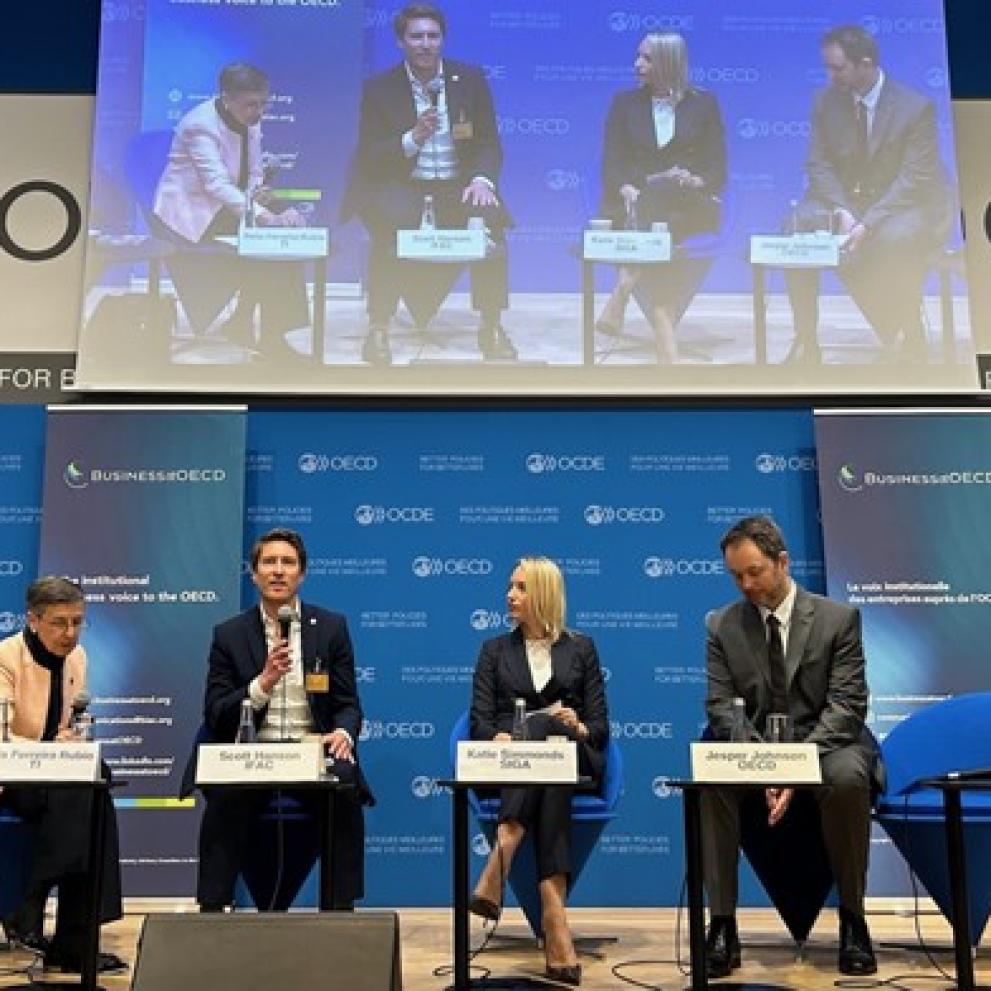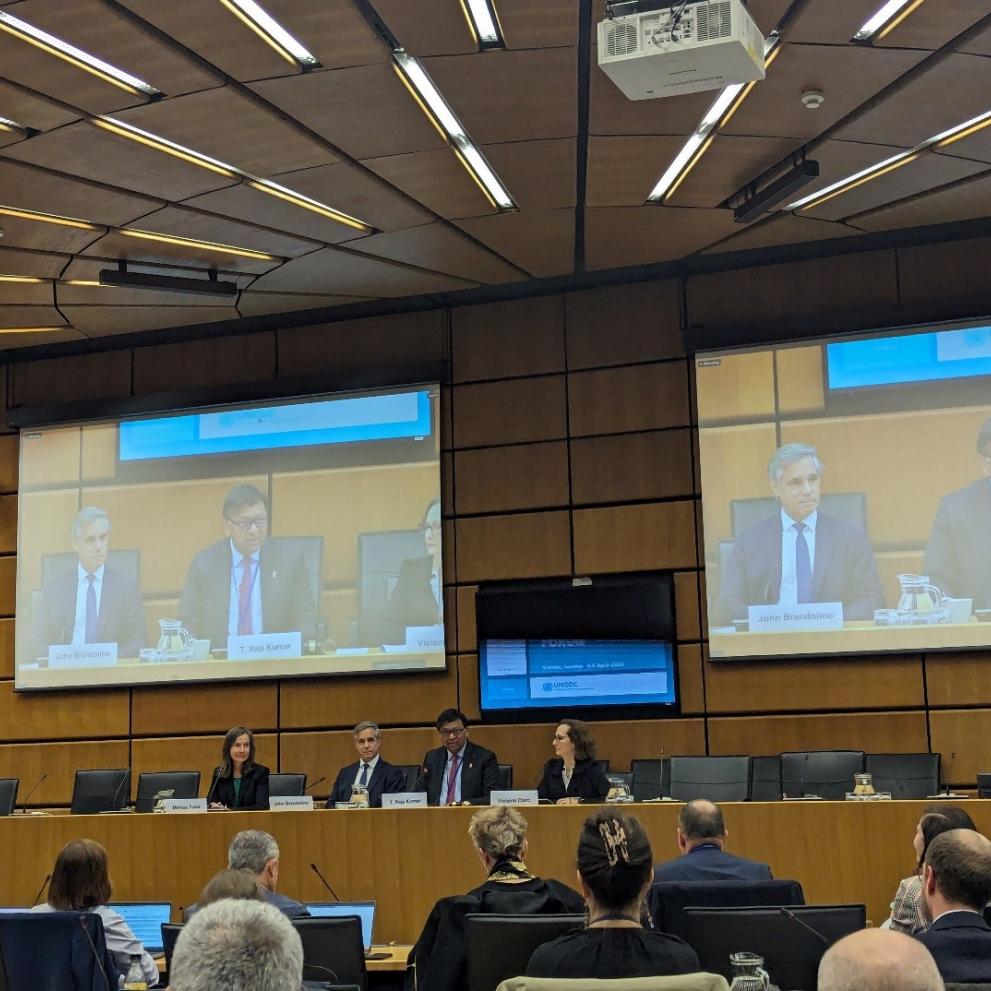As evolving threats such as climate change, artificial intelligence, and geopolitical conflicts put increasing pressure on the global integrity architecture, the public interest contributions of the accountancy profession are more important than ever.
Fighting corruption & bribery- a key priority for the global profession
2023 marked a significant milestone in IFAC’s engagement on anti-corruption and anti-money laundering (AML), seeing the implementation of important initiatives under IFAC’s Action Plan for Fighting Corruption and Economic Crime and culminating in IFAC’s participation in COSP10 (the United Nations Convention Against Corruption (UNCAC) 10th Conference of States Parties) in December.
IFAC has continued that momentum through important engagements and activities in the first months of 2024, including the Organisation for Economic Co-operation and Development (OECD) Global Anti-Corruption & Integrity Forum, the Financial Action Task Force (FATF) Private Sector Consultative Forum, and in Africa regional forums, among others.
IFAC’s engagement is set in a rapidly evolving anti-corruption and AML landscape. A continued focus on the relationship between corruption and geopolitical conflicts has been joined by the role of artificial intelligence in both amplifying and mitigating corruption risk. Adding to these, Brazil’s Presidency of the Group of 20 (G20) and Business 20 (B20) has driven renewed attention to the relationship between corruption and climate change and other environmental issues. In this context—and with continued scrutiny of the role of the accountancy profession as an anti-corruption gatekeeper—IFAC’s engagement is a crucial contribution to the global policy discussion.
Anti-Corruption at the OECD
2024 marks the 25th Anniversary of the Anti-Bribery Convention, a cornerstone in the global fight against corruption. IFAC demonstrated our support for the Anti-Bribery Convention through our contributions to the Anti-Bribery Recommendation in 2021, which highlights the importance of professional bodies and ethics in the fight against bribery. Building on this support—and as a sign of IFAC’s strengthened relationship with the OECD—IFAC convened a global event to launch the 25th Anniversary campaign in partnership with the OECD, the International Bar Association, and the Institute of Chartered Accountants of England and Wales.
Subsequently, the Anti-Bribery Convention played a central role in the 2024 OECD Global Anti-Corruption Forum and Integrity Week, held at OECD headquarters in Paris on March 25 – 28. OECD Integrity Week convenes key global anti-corruption stakeholders, the business community, civil society, government leaders and policymakers for timely and topical discussions on the current priorities in anti-corruption. Many of IFAC’s important partner organizations participated, including Business at OECD, the International Bar Association, Transparency International, the Basel Institute on Governance, the Center for International Private Enterprise, the World Economic Forum, and the Institute of Chartered Accountants of England and Wales.

Zero Corruption – Turning commitment into outcomes, at the OECD Global
Anti-Corruption & Integrity Forum.
IFAC participated in three sessions during Integrity Week, representing the global accountancy profession. IFAC’s contributions centered around efforts to empower Professional Accountancy Organizations (PAOs) to be core anti-corruption stakeholders in their jurisdictions, the importance of the IESBA Code of Ethics—in particular the NOCLAR Standard—and the crucial role of robust whistleblower protection legislation as an enabler.
IFAC highlighted the importance of PAOs being part of national anti-corruption conversation so that PAOs can contribute the valuable expertise and perspective of their members. This requires both the relevant governmental organizations to include the PAO and the accountancy profession in their conversations, but also PAOs’ proactivity in engaging with key stakeholders. To this end, IFAC has published Global Fight, Local Actions to support PAOs in developing anti-corruption engagement strategies in their jurisdictions. IFAC encourages PAOs to develop anti-corruption engagement strategies and is happy to work with PAOs to support such efforts.
IFAC also highlighted the importance of NOCLAR in the context of sessions focused on the OECD Anti-Bribery Convention and Recommendation and whistleblower protection. On the one hand, the OECD Anti-Bribery Recommendation specifically recognizes the importance to the fight against bribery of professional bodies implementing robust codes of ethics on their members. NOCLAR is an important tool in this regard. At the same time, as highlighted in the joint IFAC – CPA Canada report Understanding Whistleblower Protection: Laws, Practices, Trends and Key Implementation Considerations, effective adoption and implementation of whistleblower protection legislation is a crucial enabler of maximizing the impact of the NOCLAR Standard.
Tackling Bribery Solicitation, at the OECD Global Anti-Corruption & Integrity Forum.
Financial Action Task Force’s Private Sector Consultative Forum & IFAC’s AML Community of Practice
April marked IFAC’s second participation in the Financial Action Task Force (FATF) Private Sector Consultative Forum (PSCF), hosted in Vienna by the United Nations Office of Drugs and Crime (UNODC). The PSCF is the FATF’s primary engagement forum for external stakeholders and provides an opportunity for feedback on FATF’s strategic plan and key policy priorities such as beneficial ownership transparency, the impact of technology, and asset recovery.
While regulation of the accountancy profession (along with other “Designated Non-Financial Businesses and Professions, DNFBPs) did not feature highly on this year’s agenda, the meeting provided an opportunity to meet directly with senior FATF representatives. While on the ground, IFAC was able to discuss the FATF’s ongoing internal review of DNFBP supervision, which is expected to result in a public report later in 2024. Importantly, IFAC was also able to discuss ideas for capacity building for PAOs and the possibility of including such activities in FATF’s upcoming strategic plan.

the connection between AML and sustainable development, financial stability, and
inclusive growth.
In addition, IFAC’s engagement with the FATF supports the IFAC Anti-Money Laundering (AML) Community of Practice (AML CoP), established in November 2023. The IFAC AML CoP brings together AML leads from nearly 30 PAOs to discuss the global-level activities of the FATF, as well as share local updates, issues and best practices to support PAOs in enhancing their roles in AML.
Regional Engagement in Africa
Grey List at the 4th PFM Conference for French Speaking Countries in Africa.
Earlier this year, IFAC participated in high-level Africa regional events hosted by the Pan African Federation of Accountants (PAFA). At the PAFA – African Union – World Bank Roundtable for Key Stakeholders in the Accountancy Ecosystem in Nairobi in January, and the 4th PFM Conference for French Speaking Countries in Africa in Algiers in February, IFAC presented on the connection between money laundering, corruption, and the role of the accountancy profession in fighting illicit financial flows.
With the recent addition of Nigeria, South Africa, Kenya and Namibia to the FATF “Grey List,” over 50% of countries on the grey list are now in Africa, raising the importance of the issue for the region. At the same time, the addition of Croatia and Bulgaria—two European Union countries—to the FATF grey list shows that AML is a truly global issue, which is reflected by broad global inclusion in IFAC’s AML CoP.
Looking Forward
Going forward across 2024, IFAC looks to build on its active engagement on anti-corruption and anti-money laundering issues on behalf of the global accountancy profession. IFAC will continue to develop the AML CoP, support the OECD on their anti-corruption activities including implementation reviews of the Anti-Bribery Convention, and work with the FATF to support AML capacity in PAOs. IFAC will also leverage its role as a Network Partner in the B20 Integrity & Compliance Task Force to bring the global accountancy profession’s perspective on anti-corruption and related issues to this important global policy forum.
Finally, IFAC is working to finalize a project on anti-corruption awareness for professional accountants in business, in partnership with ICAEW and the Basel Institute on Governance. It will draw from the expertise of IFAC’s Professional Accountants in Business Advisory Group. Publication is expected later in 2024.
Useful resources
IFAC
- IFAC’s Action Plan for fighting Corruption and Economic Crime
- Is Trust Enough to Fight Money Laundering?
- Anti-Money Laundering: The Basics
- Global Fight, Local Actions: Anti-Corruption Advocacy Workbook for PAOs
- Exploring the IESBA Code
- Connecting Your Educational Programming to Emerging Trends
- Understanding Anti-Corruption Reporting
- Support is Strong for Speak-Up Culture and Whistleblower Protection at Meeting of Global Experts
- Global Experts Call for Cooperation Across All Sectors and Professions to Turn the Tide Against Corruption

